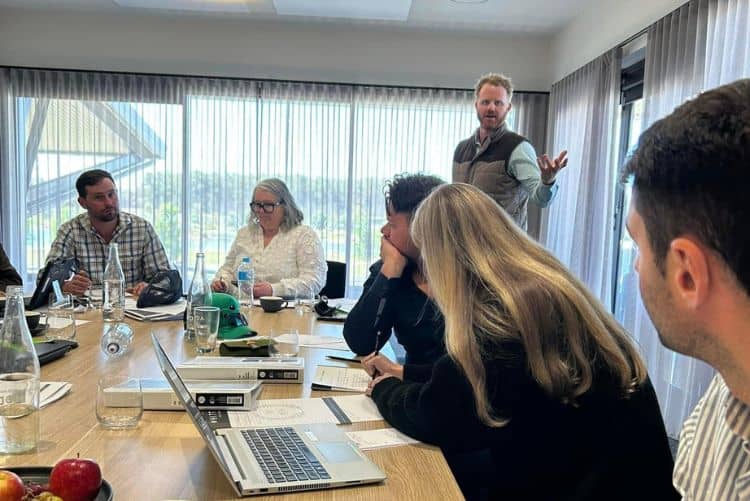We are often asked what it takes and how long it takes to become an effective and sought after facilitator. And then it’s usually followed with “Do you think I would make a good facilitator?” To help answer this question, I’ve put together my list of top traits. They can all be learned. Use them like a checklist. Take a read. Give the traits a rating out of 10. This way you will see which traits you have well in play and which ones you need to further develop.
Get Clear
Before we get into the traits let’s get clear about what we mean by facilitation. Facilitation is a process that is guided by a facilitator to achieve shared outcomes. The role of the facilitator is important here, as it is this role that supports individuals and groups to work together to achieve collective results. It’s usually used when there’s an issue to be worked through, a new topic to be explored, some conflict that is stopping progress or a collaboration that needs an independent guide. Ultimately an effective facilitator supports the process needed, reminds the group of what’s needed and guides them to an outcome that they wouldn’t have been able to achieve on their own. To be an impactful facilitator and one where you will be called back for future facilitation jobs, there’s a set of traits that I think you need as well as interpersonal skills.
Let’s Start with Your Interpersonal Skills
All facilitators have a style. There’s no doubt that your personality will play a part and the development of your natural style is super important.
“Who you are as a person will impact how you facilitate”
An authentic and natural style is what you will become recognised for, and this will work best if you build this on a set of principles and traits that holds solid. You will find this will attract those looking for facilitation services to you as they know that you will facilitate in a warm, inviting, comfortable (no matter what happens in the room), welcoming, objective and outcome focussed way while caring for each person along the way. These are called interpersonal or non – technical skills. These skills are critical to being an effective facilitator. Strong interpersonal skills are needed to bring groups of any size or type together to build collective outcomes proactively and productively.
Key Traits of a Sought After Facilitator
I’ve put my mind to what key traits you need to be able to facilitate well. Here they are.
Remember, use them as a checklist. Think about your competence with each of these and give them a score out of 10. This way you will see which traits you have well in play and which ones you need develop further.
Trait 1 – Authentic and Genuine
Bring your true self to your role as facilitator. This means embracing imperfection and being authentic and genuine. This is the currency of trust. The first and most significant role as you facilitate is to build trust in the group and the process that you will guide them through. By leading and facilitating with authenticity you build a psychologically safe environment which is critical.
Trait 2 – Stand in the Storm
Creating space for new insights from participants requires new thinking. Your job is to welcome this new thinking, even if it feels a bit stormy in the moment. Stay neutral and objective and stick to process. This is particularly important when stakes and or emotions are high as this is where the good stuff happens. Your job is to bring this good stuff through as this will result in change. The key here is to manage your own emotions and not to show or inject any of your feelings into the room or discussion.
Trait 3 – Clear Communication
You may think this is basic, and that it’s easy! But I have seen facilitators and myself come unstuck right here. Your communication needs to be clear and concise. This means people need to hear what you say or request once and know exactly what is expected of them. You need to be able to walk the line of communicating enough but not over communicating or sharing so much that it confuses people. Clear is kind and unclear is unkind. We’re after clear and kind communication.
Trait 4 – Creativity and Adaptability
These are a must! Things don’t and won’t always go to plan. Despite the best agenda, runsheet and set activities etc, there will be times when you recognise that change is needed. A tweak or change in process mid-way through the session can turn this around. Be open and honest with the group – take a break to regroup your thinking, call out what’s happening and how you are going to change an activity or do a check in and ask the group to identify what’s been achieved and what needs to happen to achieve the desired outcomes. This often works as a positive as participants can often buy in more if they feel they have helped shape the process.
Trait 5 – Ask Questions
Being able to guide not tell and ask questions are a facilitator’s super power. I often refer to it as sitting on your hands! As a facilitator you can often see, hear or feel things emerging before participants can. Your job is to sit on it and ask questions to help participants share their thoughts and ideas. By doing this you will encourage a discussion that EVERYONE engages in and when this happens real and shared results can be achieved.
Trait 6 – Acute Observation Skills
Pick up on what’s being said and what’s not being said. Pick up on both the verbal and non verbal cues of individuals and the group. Use your eyes and ears – and I often think that your eyes need to work harder than your ears to facilitate well. Again this is important when you are facilitating any activity and particularly important when facilitating high stakes or contentious issues as people will often communicate first via feelings rather than words. Learn to read body language well, knowing it isn’t a precise science.
Trait 7 – Energy Management
Your energy rubs off right from the get go on each individual and the group collectively. Show up to facilitate “intact” or allow someone else to facilitate. This means come to the session with clear, neutral but positive energy. Your energy sets the tone and will maintain the tone of the session. Many facilitators think that once the agenda and process is set their role is to keep the time! No no no, your role is to set and manage the energy in the room. Be optimistic and engage the group well and you will find a determined energy is maintained.
Over to You
So, if you haven’t scored yourself out of 10 for each of these traits, go back and do this now. Being able to know which traits need attention before you facilitate next will ensure you can achieve better outcomes for participants and that you go in with increased confidence. And please reach out for training options as we can help. Please remember traits or non – technical skills are just as important as the technical ones when it comes to facilitating well.
Until next time!



